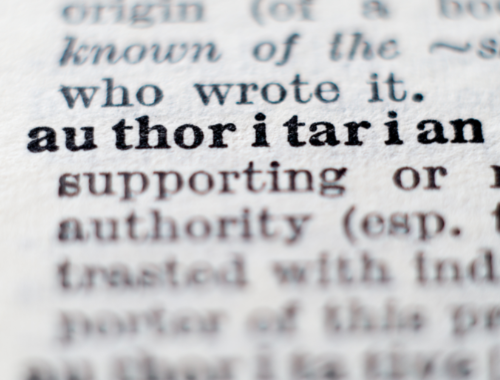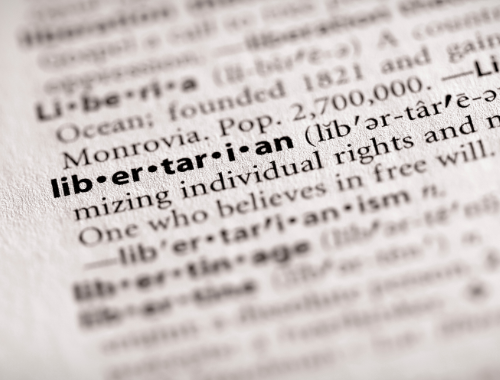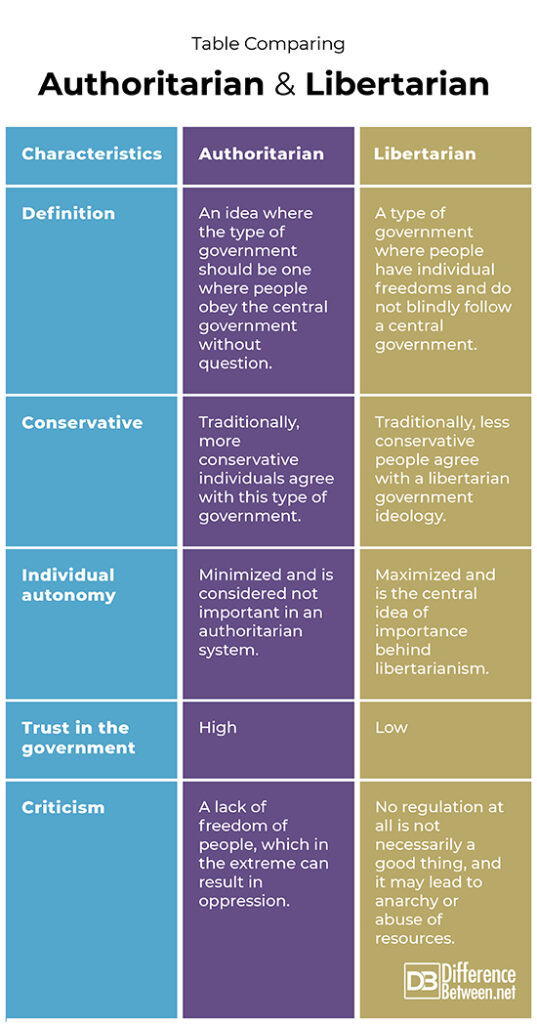Difference Between Authoritarian and Libertarian
Authoritarian is where the control of society is by a central government of a few people or a single person. Libertarian is where the government believes more in the individual rights of a person over one single leader or a few elites.

What is Authoritarian?
Definition:
Authoritarian is a type of government in which the power and control of society are either by a small number of people (known as the elites or oligarchs) or under the control of one person (an autocrat).
Impact on society:
There is a lack of civil liberties and freedoms in this type of government. People may also be limited in what type of religions they can follow. In the past, authoritarian-type governments did not allow any opposition leaders or parties during elections. However, more recently, the opposition has been allowed. A negative aspect of authoritarianism is that people may be very oppressed and have little choice in many matters.
Examples of countries with authoritarian governments:
Afghanistan and Myanmar are two examples where the government is believed to be authoritarian in nature. These countries may limit the number of accepted religions in the country and may impose strict rules for dress and behavior on their citizens.

What is Libertarian?
Definition:
A libertarian form of government is when the idea is that government should have minimal influence on people; individual rights are more important than those proposed by a single leader or small central governing body.
Impact on society:
The libertarians advocate personal choice and an individual’s right to freedom. They often oppose strict government control and regulations. There can be a downside to libertarianism if no regulation at all is present since this can lead to anarchy and abuse of resources.
Examples of countries with libertarian governments:
Switzerland, Canada, and New Zealand are ranked highly as libertarian countries in which individuals have more freedoms and liberties than in some other parts of the world.
Difference between Authoritarian and Libertarian?
Definition
Authoritarian is the type of system in which people obey the central government without question and it is where only a few people or one leader controls everything. Libertarian is where individual rights of people are deemed more important than a single government entity.
Conservative
An authoritarian system has traditionally been associated with more conservative people. However, this is not always the case today. A libertarian system has, historically, been associated with less conservative individuals.
Individual autonomy
Under the authoritarian system, individual autonomy is minimized and it is considered to be not important. Under the libertarian system, individual autonomy is important and maximized, and the idea is that individuals have a lot of freedom in choice.
Trust in the government
The public trust in government in an authoritarian system is usually high. The public trust in government in a libertarian system is usually low.
Criticism
An authoritarian government can be harmful to the population if there is a lot of oppression of individuals and their rights; people may be told how to dress and what religion is allowed. A libertarian government where there is no regulation of anything also has problems because it can lead to anarchy where people totally ignore any rules of society and do what they want. It can also lead to an abuse of resources.
Table comparing Authoritarian and Libertarian

Summary of Authoritarian Vs. Libertarian
- Authoritarian and libertarian are different schools of thought about how society and government should function in a country.
- Authoritarian governments can involve only one leader or a group of elites.
- A libertarian government promotes civil liberties and the individual person more.
- Both authoritarian and libertarian systems of government can have problems, particularly if they become extreme.
FAQ
Is libertarianism left or right?
Libertarianism was originally associated with people who were on the left but today, there is more of a tendency toward right-wing libertarianism than left-wing libertarianism.
What is the opposite of libertarian?
The opposite of libertarian is authoritarianism in which the central government has all the control and citizens must obey and follow the ideals of said government. Individuals do not have rights and freedoms that are seen in a more libertarian system of government.
What do authoritarian governments do?
Authoritarian governments do not recognize the idea of individuals having freedoms and the power and control of all matters rests with the government and not the individual.
Can a democracy be authoritarian?
There is such a thing as authoritarian democracies. This is when a leader is said to be acting in the best interests of the people. Research from 2012 indicates that, in some cases, authoritarian systems can eventually become democracies. Today some hybrid government systems exist that are a mixture of both authoritarian and democratic ideals. These hybrid governments may eventually even become democratic systems in the future.
Are libertarians socialist?
Some branches of libertarianism are socialist. For example, Marxism and anarchism are two types of socialist libertarianism.
What is a libertarian in simple terms?
A person who believes that their individual rights and freedom are more important than the ideas of a central government.
- Difference Between Rumination and Regurgitation - June 13, 2024
- Difference Between Pyelectasis and Hydronephrosis - June 4, 2024
- Difference Between Cellulitis and Erysipelas - June 1, 2024
Search DifferenceBetween.net :
Leave a Response
References :
[0]Amoros, Raul. “Mapped: The state of global democracy 2022”, The Visual Capitalist, 2022, https://www.visualcapitalist.com/mapped-the-state-of-global-democracy-2022/
[1]Eckhardt, William. "Authoritarianism." Political Psychology (1991): 97-124.
[2]Wright, Joseph, and Abel Escribà-Folch. "Authoritarian institutions and regime survival: Transitions to democracy and subsequent autocracy." British Journal of Political Science 42.2 (2012): 283-309.
